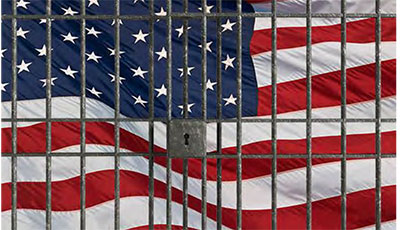
March 25, 2016, New York, NY – John Jay College of Criminal Justice President Jeremy Travis today released a report on the deliberations of The Interdisciplinary Roundtable on Punitiveness in America, which was supported by the John D. and Catherine T. MacArthur Foundation. The Roundtable hosted 36 national and international scholars who met for two days in April 2015 to address a complex and profound question: "Why is America so punitive?"
The Roundtable was convened on the heels of a closely related project, the National Academies report on the causes and consequences of high rates of incarceration in the United States. That project was co-funded by the MacArthur Foundation and the National Institute of Justice. President Travis chaired the consensus panel that produced the report. Although the National Academies report carefully reviewed the research on the causes of the prison boom, the panel was not able to address the issue of punitiveness in America, which arguably set the foundation for the rise of “tough on crime” policies that led to high rates of incarceration.
“As is reflected in this report, the scholars and experts convened for the Roundtable engaged in an extraordinary conversation that was both broad and deep,” President Travis remarked. “The discussion revealed that we clearly have much work to do to come to terms with America’s punitive criminal justice policies. Yet, the Roundtable deliberations also reflected a tremendous commitment from the participants to tackle this challenge. We all recognized that fundamental democratic values are at stake, and that the momentum for reform is as high as ever.”
Click here to read the full report.
The Roundtable meeting differed from typical academic symposia in the diversity of disciplines represented around the table – psychology, sociology and journalism; economics and political science; history, religion and philosophy; criminology and the law. The interdisciplinary nature of the gathering by itself guaranteed fresh insights and creative conceptual tensions. The inclusion of several European scholars provided a refreshing counterpoint to American perspectives. Most fundamentally, the topic – understanding punitiveness in America – represented a departure from traditional scholarly inquiries.
The Roundtable discussion revealed that significant change in the American criminal justice system will require coming to terms with the American views on punishment, which in turn requires a deep understanding of U.S. history, the unresolved legacy of slavery, the human emotions of revenge and forgiveness, the principled limits of the power of the State, the role of religion and values in shaping culture, and the dynamics of political power and economic forces. The Roundtable thus reinforced the hypothesis that animated its creation: that a sustained interdisciplinary scholarly enterprise exploring punitiveness in America can perhaps point the way to a society that is less punitive and more just.
Also on March 23rd, the Pew Charitable Trusts released new data on national and state-level punitiveness. Pew constructed a new metric called the “punishment rate,” which measures imprisonment per crime in contrast with the standard incarceration rate, which measures imprisonment per capita. In its report, Pew concluded that the increasing use of prison and decreasing levels of crime led to a 165 percent increase in the punishment rate between 1983 and 2013.
“The punishment rate provides a barometer of how much more punitive the nation as a whole has become, and several states in particular,” said Adam Gelb, director of Pew’s Public Safety Performance Project. “States with particularly high or low punishment rates and those that experienced significant increases in their punishment rates over time may benefit from identifying and examining the policies and practices responsible for their rankings and trends.”
The report of the Interdisciplinary Roundtable on Punitiveness in America was co-authored by Bettina Muenster and Jennifer Trone, with an introduction by President Jeremy Travis. Funding for the meeting of the Roundtable was provided by the John D. and Catherine T. MacArthur Foundation.
To learn more about the Interdisciplinary Roundtable on Punitiveness in America, click here.
About The John D. and Catherine T. MacArthur Foundation: The John D. and Catherine T. MacArthur Foundation supports creative people, effective institutions, and influential networks building a more just, verdant, and peaceful world. MacArthur is placing a few big bets that truly significant progress is possible on some of the world’s most pressing social challenges, including over-incarceration, global climate change, nuclear risk, and significantly increasing capital for the social sector. In addition to the MacArthur Fellows Program, the Foundation continues its historic commitments to the role of journalism in a responsible and responsive democracy; the strength and vitality of our headquarters city, Chicago; and generating new knowledge about critical issues.
MacArthur is one of the nation's largest independent foundations. Organizations supported by the Foundation work in about 50 countries. In addition to Chicago, MacArthur has offices in India, Mexico, and Nigeria.
About John Jay College of Criminal Justice: An international leader in educating for justice, John Jay College of Criminal Justice of The City University of New York offers a rich liberal arts and professional studies curriculum to upwards of 15,000 undergraduate and graduate students from more than 135 nations. In teaching, scholarship and research, the College approaches justice as an applied art and science in service to society and as an ongoing conversation about fundamental human desires for fairness, equality and the rule of law. For more information, visit www.jjay.cuny.edu.



